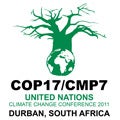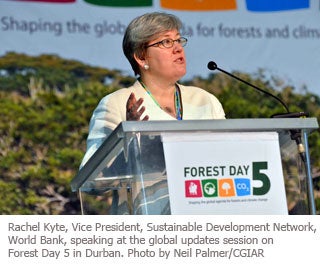 After Agriculture Day, comes Forest Day for about 1,200 scientists, donors, NGOs, policymakers, journalists and climate negotiators gathered in Durban, with its own well-oiled choreography of plenary sessions and discussion forums.
After Agriculture Day, comes Forest Day for about 1,200 scientists, donors, NGOs, policymakers, journalists and climate negotiators gathered in Durban, with its own well-oiled choreography of plenary sessions and discussion forums.
My assigned role during these two days is to act as a go-between and help break down the silo mentality that can affect expert communities working on narrow themes. Many people already seem to be reading from the same music sheet –there is growing recognition that the fate of forests and agriculture are intricately linked.
 Agriculture (large and small) is one of the main drivers of deforestation and forest degradation in many parts of the world. And growing needs for food, energy and income will continue to exert tremendous pressure on the forest “frontier” in the future.
Agriculture (large and small) is one of the main drivers of deforestation and forest degradation in many parts of the world. And growing needs for food, energy and income will continue to exert tremendous pressure on the forest “frontier” in the future.
Forestry and agriculture experts concerned by climate change seem to be reaching for broadly symbiotic solutions at the landscape level – climate-smart programs based on a more complete understanding of the carbon and water cycles that sustain both agriculture and forests.
Forest Day, now in its fifth year, always timed to coincide with UNFCCC talks, can take great credit for publicizing carbon emission research and putting forests on the map of climate change negotiations.
But farmers and forest-dwellers are convinced less by talk and publications than by tangible results. Simple climate-smart proven techniques such as protecting and planting trees, harvesting water and composting, produce multiple benefits. These range from increased yields, improved soil fertility, watershed protection, wind protection, pollination and reduced soil erosion. And, yes maybe even - carbon payments.
Farmers are not averse to thinking about NGOs, business development programs and carbon markets as sources of additional financing for their hard work. Nor should we shy away from the innovative partnerships that are testing the waters of climate finance, from a soil carbon project working to improve agricultural practices for smallholders in Kenya, to biogas projects in Nepal, and “REDD readiness” plans and forest investments in a growing number of forested tropical countries.
Now that we all agree on an integrated approach to forestry and agriculture (landscape management), it may be time to root for an integrated approach to climate change action: Adaptation-based mitigation is a no-regrets option.
Shifting paradigms isn’t easy and requires visionary leadership. Frances Seymour, CIFOR’s Director General announced she was stepping down in June 2012 after almost six years at the helm. Extraordinarily dedicated, talented and dogged, the coming together of this critical agenda is due in part to her.
Follow Rachel Kyte's tweets (@RKyte365) at her liveblog from the COP17 conference in Durban


Join the Conversation